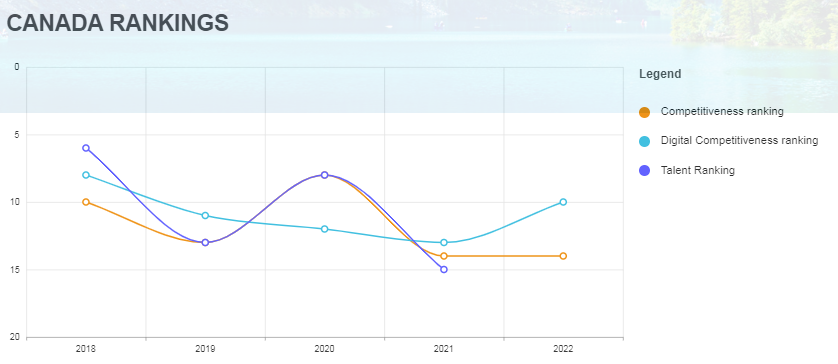Last updated: October 26 2022
Competitiveness in Canada: Growing Our Way Out of a Recession

Your clients may wish to understand how poised their investments are for success in the short term, and that may involve a discussion about the competitiveness and the growth of the Canadian economy. How competitive is Canada and why is that important as a recession looms in 2023?
Why is competition important? Lower prices can occur when firms have to compete with one another and beyond our borders. In addition, higher quality and greater innovation can result when businesses compete with one another. Competition for labour is also healthy because it leads to higher wages and better work conditions. In the current inflationary times fraught with skilled labor shortages, healthy competition can help engage both more clients and staff.
Markets become less competitive when there are fewer enterprises competing with one another. Worse, there can be a winner-takes-all scenario: dominant firms can charge high prices, block competitors and decrease quality or services. Prices and profits can rise and wages decrease.
How do we measure competitiveness? The WEF (World Economic Forum) measures ninety-eight variables classified under twelve pillars of success to measure international competitiveness:
- Business dynamism
- Health and primary education
- The financial system
- How well a country harnesses and adapts Information and Communications Technology
- The capability for Innovation
- Its Institutions
- Degree of Infrastructure
- Efficient labor markets
- Macroeconomic stability and framework
- Market size and efficiency
- Efficient production processes for new goods and services
- Higher education and training
Another measure is the The IMD World Competitiveness Yearbook (WCY)[1], which was first published in 1989 and is based on 333 competitiveness criteria. This annual report is a worldwide reference point on the competitiveness of countries. Canada now ranks 14th overall, which is pretty good, but we were in the top 10 in 2018. Our decline in rankings is best articulated by this chart:

Our overall ranking shows improvements in economic performance, but declines in government efficiency, business efficiency and infrastructure. Most notably, however, is a significant decline in our talent ranking.
According to this analysis, challenges for Canada in 2022[2] have included “broad-based and persistent inflation exacerbated by commodity price increases and supply chain disruptions; extreme weather events, a housing affordability crisis, a labor market imbalance coupled with high unemployment and high job vacancy rates, according to the report. Low investment capital is also creating challenges for innovation and retention of scale-up companies.”
Why is talent and productivity so important? Canada is known for lagging behind the US in productivity, which affects our competitiveness. T he Business Council of Alberta has done some good work on explaining this:
he Business Council of Alberta has done some good work on explaining this:
“To put the difference in perspective, Canadians make around $54,000 CAD per year on average while their American counterparts make around $67,000 CAD. In other words, by traveling just a few hours south, incomes increase almost 25% on average. What is it about the US or Americans that is different?
Part of the gap is unrelated to productivity: Americans work more hours than we do—about 3.5% more. If Canadians worked the same number of hours as Americans, they would instead make closer to $56,000. That closes the gap a little, but the remaining 20% point disparity is due to a difference in the value of output produced per hour worked (i.e., productivity).
While the average American worker produces $66 of value per hour, the average Canadian workers produces just $50 of value per hour. What enables Americans to work not harder but rather smarter than Canadians?”[3]
It’s a good question. While high taxes are a part of the reason for our productivity gap, they are not the main problem. Business investment in tools and technologies, skills development and the ability for workplaces to innovate, are all essential missing ingredients.
If Canada focused on these areas, our competitive landscape would improve.
So how much do taxes matter? We’ll discuss that next week.
Bottom Line: Whether Canada is competitive – by all indicators - matters to everyone because it affects our current and future standards of living. Economies that consider what it takes to bring new momentum to economic competitiveness will succeed in improving lives for their citizens. That includes competitiveness in pricing, wages and the opportunity for lifelong learning.
[1] The IMD World Competitiveness Center, Switzerland, www.imd.org/wcc
[2] Provided by: Information and Communications Technology Council (ICTC)
